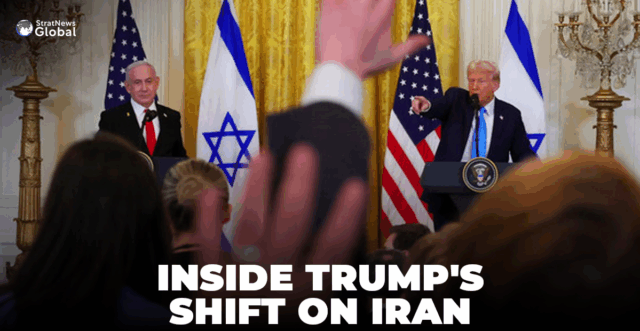About a month ago, speaking at an investment forum in Saudi Arabia, U.S. President Donald Trump, a self-proclaimed peacemaker, delivered a warning to Iran that later proved prophetic.
“We’ll never allow America and its allies to be threatened with terrorism or nuclear attack,” Trump told the crowd, sending a message to the leadership in Tehran.
“The time is right now for them to choose. Right now. We don’t have a lot of time to wait. Things are happening at a very fast pace.”
Trump Warns Iran
That May 13 ultimatum received little attention at the time.
But behind the scenes, the president already knew an attack on Iran could be imminent—and that there might be little he could do to stop it, according to two U.S. officials.
By mid-May, the Pentagon had begun drawing up detailed contingency plans to aid Israel if it followed through on its long-held ambition to strike Iran’s nuclear program, the officials said.
And the U.S. had already diverted thousands of defensive weapons away from war-torn Ukraine toward the Middle East in preparation for potential conflict, according to a Western source familiar with the matter and a Ukrainian source.
The Pentagon declined to comment for this story.
This account of the weeks and days leading up to Trump’s decision to throw his support behind Israel’s bombing campaign is based on interviews with over a dozen administration officials, foreign diplomats and Trump confidantes, most of whom spoke on condition of anonymity to discuss private deliberations.
The picture that emerges is that of a long, secretive preparation process and a president who, for weeks, found himself torn between diplomacy and supporting military action – and was ultimately persuaded in part by an ally whose actions he did not fully control.
While Trump has long described himself as a peacemaker – dispatching Middle East envoy Steve Witkoff to the region several times to try to seal a diplomatic accord – he had several trusted political allies pushing him to back an Israeli attack on Iran’s nuclear facilities.
And U.S. intelligence had indicated a unilateral Israeli strike was possible, even likely, even if Trump wanted to wait, according to two U.S. officials.
While it is unclear if Israeli Prime Minister Benjamin Netanyahu or Trump’s more hawkish allies ever got him to a “yes” to Israel’s plans, by the days leading up to the strike, he was at least not a “no,” according to two senior U.S. officials and a senior Israeli source.
That stance, people familiar with the dynamics said, helped tip Israel into action.
Trump’s Quandary
Seven days into the Israel-Iran conflict, Trump is left with a dilemma, said Aaron David Miller, a veteran diplomat who has advised six secretaries of state on Middle East policy.
He can try again to pursue a diplomatic resolution with Iran, allow Iran and Israel “to fight it out”, or he can enter the war with U.S. airstrikes on the deeply buried Fordow enrichment plant, a step that would have unknown consequences for the region.
Trump “let it (the Israeli attack) happen”, said Miller, a senior fellow at the Carnegie Endowment for International Peace policy institute. “He got on the tiger, and he’s riding it.”
The White House on Thursday said that Trump will make a decision on whether the U.S. will get involved in the conflict in the next two weeks.
The White House, the Israeli prime minister’s office and Iran’s delegation to the United Nations did not respond to a request for comment.
Tehran has consistently said its nuclear program is designed for peaceful purposes only, a conclusion Washington has rejected.
One of the first hints that Trump might sign off on an Israeli bombing campaign came in April.
During a closed-door meeting on April 17, Saudi Arabia’s defence minister delivered a blunt message to Iranian President Masoud Pezeshkian: take Trump’s offer to negotiate an agreement seriously because it presents a way to avoid the risk of war with Israel.
He had done so before. In 2020, despite a foreign policy during his first term that was otherwise marked by restraint, Trump ordered a drone strike that killed Major General Qassem Soleimani, the head of the Iranian Revolutionary Guards’ division responsible for its international operations.
By the time Trump talked to Netanyahu on Monday, June 9 — one of many phone calls in recent days — his stance was one of tacit, if not explicit, approval, according to one U.S. and one Israeli official.
By Wednesday, June 11, it was clear to Washington that Israel’s plans were a go.
That evening, Israel launched its overnight barrage, an attack that almost immediately escalated into an air war.
Seven days on, U.S. intelligence believes the strikes have set Iran’s nuclear ambitions back by only months.
Trump has said he is considering further escalation. As of Thursday, his intentions were still unclear.
(With inputs from Reuters)





